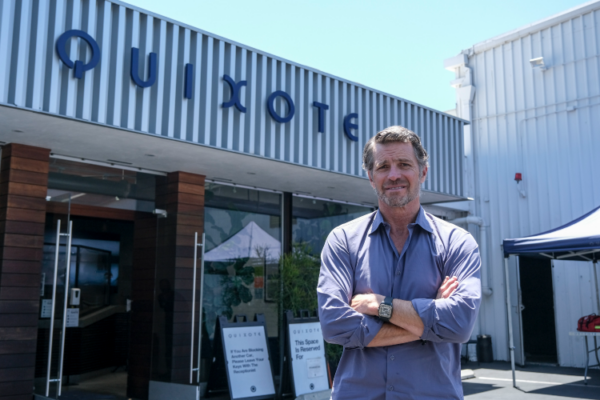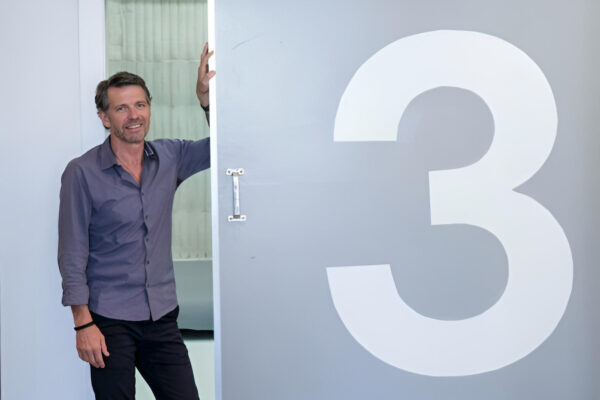Behind every film, commercial, and TV production, there are a million moving pieces. Studios, lighting equipment, stages, and cast trailers are being managed in the background to make every production come to life. Without the people behind the scenes, the entertainment industry would collapse.
When Mikel Elliot, founder of Quixote Studios, was breaking into the industry, he wasn’t aiming for center stage, but rather to be the one who made productions possible.
Growing up, Elliott constantly followed his dad around on sets. As a grip, which is a technician responsible for setting up and managing all the equipment needed for cameras and lighting, Elliott’s dad knew the ins and outs of production. And soon he did too.
Of course, the world of production wasn’t the only thing his dad showed him growing up. “My dad put together a savings program. For every dollar I earned or put into my little savings account, he’d put in 50 cents,” Elliott says. This instilled an appreciation for money in young Elliott’s brain. By the time he was in fifth grade, he had a job, simply because he wanted to have money. “I’d get out of school at three. I’d have to drive to get my 50 newspapers from some guy out of a garage. I’d make $15 to $20 per week; I was the richest kid in my class.”
Through an unwavering belief in his abilities and a creative approach to every situation, he eventually built Quixote, a top provider of sound stages and production services for film, commercials, and TV.

Mikel Elliott, Founder and CEO, Quixote Studios (photo courtesy of Quixote Studios)
LEARNING TO SELL
Right after graduating from UCLA with a degree in English literature, Elliott joined International Computers Limited (ICL) as a salesman. For nine years, he worked in B2B computer sales, pitching new technology to law firms, doctor’s offices, school systems, and more. “Lawyers were the hardest,” he says, “just brutal customers.”
The work was grueling, and computers weren’t his passion, but eventually Elliott became salesman of the year, worked his way up in the company, made good money, and learned how to sell. He could sell to clients that didn’t even want to meet with him.
“It’s all about charisma at first, but then it becomes about the relationships you build,” he says.
Despite his success, he was still selling for someone, so he decided to start selling for himself and jump into an industry that he was more passionate about: Entertainment.
“BETTER THAN THE OTHER GUYS”
At first, the goal was to make movies. But it soon became clear that without a network of agents and studios, making movies wasn’t just something he could start doing right away. Perhaps it was his father’s teaching rolling around in his head, or maybe it was simply that his entrepreneurial brain saw an opportunity and jumped on it, but Elliott decided to break into the production side of entertainment and work with producers.
“We knew we could do it better than the other guys,” he says.
Elliott noticed that major productions had to reach out to one guy to rent trucks, another guy to lease studio space, and another guy to secure lighting for the production. “Everything was so fragmented, and nothing was done professionally,” he says. “It was more like, ‘Oh this guy owns some equipment,– they have some vehicles or maybe a studio.’”
Instead of making production crews go to 10 different places for 10 different things, Elliott started bringing everything together under one roof, and with that, Quixote Studios was born.
Elliott, along with his business partner Jordan Kitaen, a trusted classmate and friend from UCLA, purchased a couple of motor homes. These “studios on wheels” could be taken to different locations and used for commercials and photoshoots. It wasn’t flashy or groundbreaking at first, but with a full-service approach for its clients, Quixote began to offer a value proposition that just wasn’t found anywhere else on the scene.
EARLY STRUGGLES
For the first couple of years, Elliott and Kitaen had to work hard to keep Quixote afloat. They didn’t have much capital, and in the entertainment industry, getting things done without capital is nearly impossible. They had just gotten a small studio to diversify their offerings, but paying rent wasn’t always easy.
“We had to scramble to stay alive,” Elliott says. “We had to renegotiate deals with our landlord, and at one point, I thought, ‘Screw it. We’re not going to be studio guys. I’m going to have to get rid of this and we’ll just be transportation guys.’”
But Elliott pushed forward and kept things moving long enough to secure a $300,000 SBA loan. With it, Elliott and Kitaen started building out the studio located on Fuller and Santa Monica. It became well-known in Hollywood, propelling the brand, and catching the attention of celebrities. Quixote began hosting impressive parties, earning goodwill, and becoming a brand that big names wanted to work with.

Quixote’s Mikel Elliott outside of a Burbank studio.
BRAND BUILDING > MARKETING
When Quixote was about 10 years old, it had successfully transitioned from being a small production services company with a few motorhomes used for commercials to a large firm with studio locations across LA and had the resources and capital to work with Film and TV Productions.
“At this point, we landed Criminal Minds, and that launched us, they ended up staying 15 years,” Elliott says. “ On our Verde Production Vehicles and Trailers we were the go-to guys for high end talent. If George Clooney was doing a partnership with Nespresso, they called us. If Julia Roberts was doing something, she used our trailers.”
Because of the way Quixote was built, everything was cross-promotional. If a client needed equipment, studios, or vehicles, they could get it all from the same source. But, as Elliott looks back, he says it wasn’t really about marketing at that time.
“There were no good marketers in business; there were no brand builders.” We decided to focus on being the go to brand for crew both above and below the line” he says, noting that in the entertainment industry, building a brand relies on keeping people entertained. “We had PA parties and producer parties every summer. Thousands of people in the industry would come out, we’d spend $200,000 on these big events, and the goodwill we generated from those parties was something that no one else could replicate.”

SIMPLIFYING TO SELL
What started out as a mobile studio provider for photoshoots in 1995 turned into a massive production services company over nearly three decades. Boasting 325 employees, long-term lease rights to 23 soundstages in L.A. alone, a fleet of 600 trucks and trailers and premier clients like Disney, HBO, Sony, and Paramount. Quixote changed how the entire industry thought about entertainment production. In 2022, Quixote Studios was acquired by Hudson Pacific for $360 million.
The complex intricacies of Quixote made it challenging to navigate the sales process. With so many verticals and different ways of analyzing its financial data, the company needed to be simplified before it could be sold. Elliott spent time breaking down the structure of Quixote, identifying and presenting its main KPIs in an easy to view executive dashboard and scaling back on categorization complexity, only focusing on stages, equipment, and vehicles. With the utilization rate of each of these three classes in hand, potential buyers could look at the business in broad strokes or decide to drill down into individual assets using advanced search logic.
The sale closed just as the industry was facing external hardships. Interest rates were rising, the cost of capital was moving in lockstep, and studios were scaling back to stay profitable. After a successful sale, Elliott stayed on to help with the transition, but now, as he looks at his future, Elliott is eager to take on another challenge and build a new brand. After all, it’s what he’s best at.














































